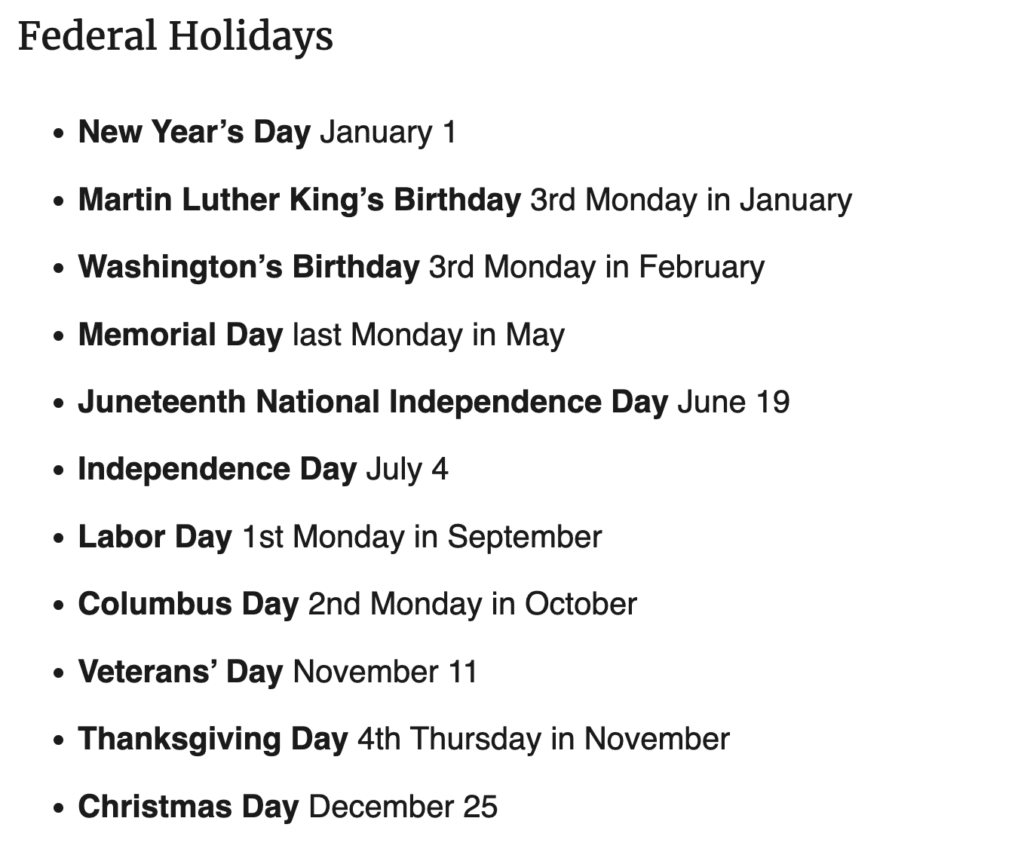No, freelancers do not typically receive holiday pay. Unlike traditional employees, freelancers are independent contractors who manage their own holiday entitlements.
As a self-employed individual, I have learned that while holiday pay, paid leave, and benefits like annual leave are standard for full-time employees, freelancers must navigate these perks independently. Whether it’s public holidays or vacation time, the responsibility for financial planning and compensation falls squarely on the freelancer’s shoulders.
My journey has taught me that careful consideration of employment status, work arrangements, and client communication is essential to ensure that my freelance work does not suffer during my well-deserved breaks.
To learn in detail about each point regarding the absence of holiday pay entitlement for freelancers, including insights on independent contractor status versus a part-time employee, national insurance contributions, and how to manage vacation time without paid vacation or employee benefits, follow the article below.
Key Takeaways
- No statutory holiday pay for freelancers; it’s self-managed
- Financial planning is key for unpaid vacation time
- Clear client communication about holiday leave is crucial
- Strategic work scheduling can compensate for downtime
- Understanding of fair labor practices benefits freelancers
- Preparation and fiscal responsibility enable holiday enjoyment without business impact
Do Freelancers Get Holiday Pay?
Freelancers generally do not receive holiday pay, including bank holidays, as they are not typically entitled to paid time off like full-time employees. However, freelancers can still take time off for vacations or breaks, but they need to budget for these periods and adjust their workload and rates accordingly.
It is essential for freelancers to plan ahead, communicate with clients, and budget for their time off to ensure they can afford to take a break without disrupting their income. Freelancers can also consider taking shorter vacations or staycations to recharge without incurring significant costs.
To illustrate, here’s an insight into how I maneuver these specifics:
- When public holidays approach, I forgo the expectation of automatic holiday pay, instead, adjusting my rates to compensate for these otherwise non-billable days.
- Collaborating with a trade union, if available in my field, sometimes helps in establishing fair practices and rates that acknowledge the lack of traditional benefits.
- The concept of sick pay transforms into a self-directed insurance policy—setting aside funds for unexpected sick days.
In absence of an overseeing employer, the onus rests on me to strategize around holidays, ensuring that I don’t find myself in a financial lurch during times of rest. I’ve learned to treat myself in many respects as a mini-enterprise, where every day of work and every hour of rest must be strategically balanced for continuous professional sustainability.
Navigating Public Holidays as a Freelancer

When you’re a freelancer, public holidays and bank holidays can feel like double-edged swords. On one hand, they’re woven into the national fabric as shared time for rest and celebration. Yet for me, as an independent contractor, there’s an asterisk attached: these holidays aren’t synonymous with paid time off.
My work as a freelancer means I celebrate a different kind of freedom—the freedom to dictate my holiday time and manage my vacation time with the autonomy that traditional employees rarely experience.
My entrepreneurial journey means that taking a day off when the nation does comes with a cost – quite literally. Unlike employees who rely on employment rights and holiday pay, my holiday entitlement is a self-made concept, where public holidays are unique to my business. I face the decision of switching off my work phone to enjoy the festivities or keeping my home office running. It’s solely up to me to make sure my business is minimally affected during these times.
The self-employed life poises an inequality when it comes to national celebrations like public holidays. No client is responsible for topping up my income to account for bank holiday pauses, nor is there any national insurance contribution made on my behalf to cushion the lack of earnings during vacation times. It’s my business, and my responsibility alone. The holiday simply underscores the reality that my holiday income continuity is a solo endeavor.
- The pros: full control over my work schedule, even on public holidays.
- The cons: no automatic holiday compensation, making financial foresight pivotal.
- The strategy: decide whether to join the holiday hiatus or to continue working for uninterrupted earnings.
So, how do I navigate this world where employment rights typically associated with holiday entitlement don’t apply to me? I plan.
It’s essential, especially during significant bank holiday seasons, to estimate the financial implications of taking time off versus the potential lost income if I stayed working. As a freelancer, my holiday planning involves an intricate dance with my own business sense, a dance that requires grace, discipline, and sometimes, tough decisions about work-life balance during supposed times of leisure.
Amidst the festive aura that public holidays bring, I craft my own version of the holiday, one that harmonizes the cheer with the continuity of my entrepreneurial quest.
Planning Authentic Downtime for Freelancers
As I work as a freelancer, I’ve learned that scheduling regular downtime is crucial for long-term success. While traditional jobs have set vacation time, as a freelancer, I understand the importance of intentionally planning breaks to rest and rejuvenate. Taking these breaks helps me come back to work with new ideas and energy for my clients.
Importance of Proactive Holiday Planning
In my experience, holiday planning is the scaffolding upon which successful freelance careers are built. I consider it my mission to strategize these periods of rest, ensuring I’m not just always on call, but that I have designated blocks of time that allow me to disconnect entirely. This practice isn’t just beneficial—it’s critical for my mental well-being and creative productivity.
Building a Financial Buffer for Unpaid Breaks
It’s no secret that my work as a freelancer doesn’t offer the cushion of paid vacation. To counter this, I’ve learned to establish a financial buffer. It’s my personal line of defence against unpaid breaks, acting as my self-curated vacation pay. With each project, I earmark funds for this purpose, ensuring when I do step away, I’m not plagued by financial stress, only peace of mind.
| Consideration | Strategy | Outcome |
| Proactive Planning | Setting specific dates for vacations well in advance | Protected personal time and client preparedness |
| Financial Buffer | Allocating a percentage of each payment to vacation fund | A guilt-free break without financial worry |
| Communication | Notifying clients early about planned time off | Smooth workflow with no client surprises |
| Annual Leave | Comparing self-set leaves to traditional employee benefits | Appreciation of flexible schedule and self-management |
Collaborating with a trade union can provide valuable resources and insights for successful holiday planning and financial management when working as an independent contractor. Utilizing templates and budgeting tools from such organizations can help maintain a financial buffer. Additionally, trade unions’ advocacy for fair compensation can assist in justifying rates and ensuring economic stability.
As I look forward to my next break, I know that with a solid plan and financial foresight, I can truly enjoy my time off—unencumbered by the troubles of a limited company or a contractor without such strategies in place.
The Reality of Freelance Work During Festivities
As someone who’s navigated the choppy waters of freelance work during the holidays, I’ve learned that festivities can be a time of both celebration and careful planning. Recognizing that there’s no one to grant paid time off, I’ve had to adopt an entrepreneur mindset, blending my work responsibilities seamlessly with my eagerness to partake in holiday cheer.
The Entrepreneur Mindset of Managing Work and Play
Entrenching work and play into my festive season initiates with defining what success looks like for both. Since holidays like Christmas day and Thanksgiving day stir the joy within us as well as within our clients, it’s crucial to establish how to maintain work without letting the festivities slip by. For me, this has meant being both a meticulous planner and a spirited participant, carefully structuring my calendar to ensure that client expectations are met while I savor the essence of the holiday season.
Client Expectations and Communication during Holidays
Communication is often the bridge between a satisfied client and a missed opportunity. Well-ahead of vacations and holidays, I initiate conversations about anticipated downtime, reinforcing transparency and managing client expectations.
It’s a balance of ensuring I’m available for urgent requirements while also setting the stage for a well-deserved holiday break. Whether it’s proactive outreach to discuss project timelines or setting automated messages to signify my absence, every action is targeted towards a harmonious outcome for both my clients and me—affording peace of mind during my unpaid holiday leave.
- Inform clients of vacation plans in advance
- Ensure urgent work is completed or rescheduled before holiday leave
- Set up out-of-office replies and emergency contact protocols
- Communicate a clear restart date post-holiday to manage expectations
| Holiday | Work Approach Pre-Holiday | Communication Strategy | Resumption of Work Post-Holiday |
| Christmas Day | Complete priority tasks ahead of schedule | Notify clients 2 weeks before leave | Gradual project re-engagement |
| Thanksgiving Day | Delegate tasks when possible | Discuss availability for urgent needs | Align meetings for the following week |
As an independent contractor wearing multiple hats, my work during the holidays has evolved to reflect a genuine sense of work and play. The festivities are as important as meeting client deadlines, as they renew my spirits and prepare me for a fresh start. Despite not having the traditional holiday pay entitlements or the backing of a trade union, my self-employed status offers the flexibility to design a holiday experience that meets both my personal desires and my professional obligations.
Mapping Out Freelance Business Post-Holiday Leaves
As a freelancer, the transition back to work after a holiday can often feel like setting sail without a compass. Having just returned from my most recent vacation time, I’m reminded of the delicate process of picking up where I left off.
Even though we, as freelancers, self-employed persons, or independent contractors, don’t have holiday pay entitlement, we must navigate post-holiday leaves with sharp business strategy and client management to maintain the health of our freelance business.
For more information on the differences between independent contractors and employees, including the implications for holiday pay, check out the this guide.
Business planning after a period of leave is critical. It means assessing my current projects with fresh eyes, understanding which of my engagements require immediate attention, and discerning if my clients’ priorities have shifted during my absence.
Coming back from a holiday requires patience and strategic efforts to avoid overwhelming yourself and compromising quality.
I find it crucial to connect with my clients as soon as I’m back, which helps in realigning on the agreed work and informing them of my availability during this holiday time recovery phase. This is not just for their benefit, but also mine, as it allows me to gauge the workload and set realistic deadlines that are beneficial to both parties.
Below is a table showcasing my step-by-step process for client management and business planning after a holiday:
| Phase | Action | Outcome |
| 1. Immediate Connection | Reach out to clients and update them on my return. | Establish communication and set clarity on current status. |
| 2. Assessment | Evaluate project priorities and deadlines. | Identify urgent tasks and organize schedule accordingly. |
| 3. Engagement Planning | Map out a plan for ongoing and upcoming projects. | Visualize the roadmap for work in the coming weeks. |
| 4. Capacity Check | Align project expectations with personal capacity post-holiday. | Ensure workload is manageable and sustainably paced. |
| 5. Task Delegation | Specify tasks that can be outsourced or delegated. | Optimize productivity and focus on core specialties. |
Remember, the key is not to rush into things. Allow yourself the necessary leeway to get back into the groove. It’s part of the freelance business model to factor in these post-holiday periods and adjust your business strategy accordingly. As an independent contractor, I’ve come to realize that my greatest asset is not just the skill I bring to the table but also my ability to manage my workload effectively after a refreshing holiday leave.
Creating Financial Strategies for Holiday Seasons
As a freelancer, I’ve learned the importance of financial planning, especially when it comes to unpaid holidays during the holiday seasons. To navigate these occasions without the stress of lost income, I’ve adopted a series of financial strategies that allow me to enjoy my time off and ensure I’m not left in a lurch.
Setting Aside Funds for Unpaid Holidays
One of the most effective methods I’ve found is to set aside funds specifically for vacation periods, creating a buffer that acts as my own version of vacation pay. This means allocating a portion of my income each month into a holiday savings account. It’s not just about saving money; it’s about income management and preparing for the times when I won’t have active cash flow due to unpaid holidays.
Budgeting Tips for Freelancers During Vacation Periods
Here are some budgeting tips I’ve put to use that I’d love to share with my fellow freelancers:
- Start with a clear understanding of your fixed expenses to know how much you need to earn before taking any time off.
- Review past earnings to gauge how much you typically make, and then create a savings goal based on a percentage of those earnings.
- Consider offering discounted services to clients if they’re willing to pay in advance, boosting your holiday fund.
- Be transparent with clients about your holiday pay entitlement as a self-employed individual—communication is key!
- Look for opportunities to work on projects that may have a higher pay rate but flexible deadlines, allowing you to work ahead and take the time off you need.
These budgeting tips and financial strategies have helped me transform my vacation periods from financial stressors into relaxing breaks. As independent contractors and freelancers, managing our financial planning around holiday seasons takes discipline, but it pays off in the joy of a well-deserved rest.
Conclusion & The Future
Freelancers generally do not receive paid holiday time, including bank holidays. This is because they are considered self-employed and not employees, and as such, they are not entitled to statutory holiday pay or other employment benefits.
However, freelancers can still benefit from taking time off for rest and relaxation. They can use bank holidays as a prompt to take a break, which can improve their productivity and overall well-being. Freelancers can also budget for their time away, setting money aside for holidays and preparing for lost work days.
In the future, there may be changes to the way holiday pay is handled for freelancers. The UK government has agreed to promote awareness of workers’ rights when it comes to holiday pay, which could lead to more clarity and potential changes in the law. However, as of now, freelancers are generally not entitled to paid holiday leave.
In conclusion, while freelancers do not receive holiday pay, they can still benefit from taking time off for rest and relaxation. The future may bring changes to the way holiday pay is handled for freelancers, but as of now, they are generally not entitled to statutory holiday pay or other employment benefits.




